Securing
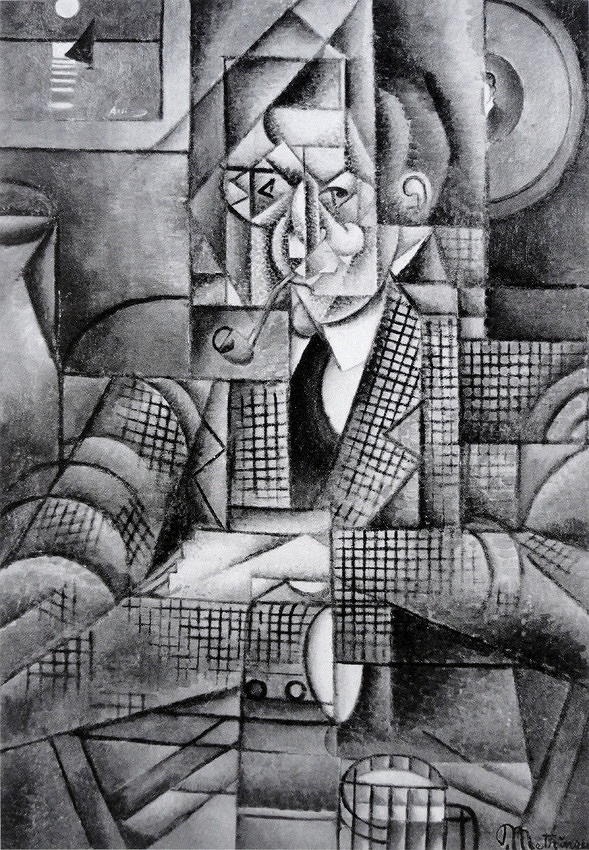
Jean Metzinger: Man with a Pipe (Portrait of an American Smoker) (1911-12)
" … acknowledging this simple fact."
Two full years since my friend Thomas strongly suggested that I install a PastWord security application, I finally invited my tech guy over to install the system for me. I'm nobody's application installer, apt as I am to not quite understand the app's authors' intentions and instructions being inevitably inaccurate and imprecise, I much prefer to hire a professional to perform installations. I quickly felt satisfied with this decision as a fresh and new dizzying array of terms and functions flashed before me. My job was relegated to repeatedly entering a single PastWord as each installation stage progressed. Brian The Tech Guy somehow managed to resurrect long lost PastWords and convert them to new uses, like actually providing access for a change instead of simply serving as barriers to entry. I realized as he installed this package that I had been living incredibly insecurely, my only potentially saving grace being that I'd set up my systems in such a convoluted manner, that nobody could have ever been very likely to crack the codes, though they most prominently kept my systems secure from myself.
I, like everybody, possess a long, shadowy, and largely insecure history with security.
Narrowing
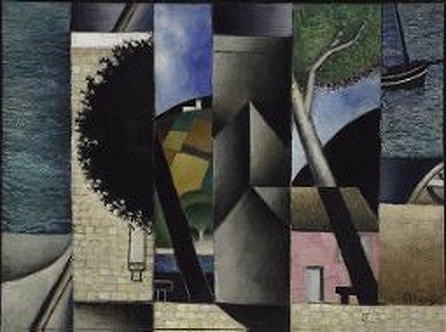
Jean Metzinger: Landscape (Marine, Composition Cubiste) (1912)
" … what I imagine to be their essence."
I've been noticing that the range of my Reconning radar has been Narrowing since The Muse and I returned from exile. On exile, I maintained awareness of more than just my immediate vicinity, but also of the goings on 'back home.' Back home, I do not reciprocate my interest. I doubt that I'll ever return to Colorado's Front Range. I think of it as a place we holed up in for a few years before repatriation. Now home, I've lost interest in that place, which never felt terribly hospitable or home-like, anyway. I never held more than a tactical interest in the local politics since I planned no future or legacy there. It's now become a good riddance for me.
Before exile, The Muse and I roamed a wide area.
Gettin'
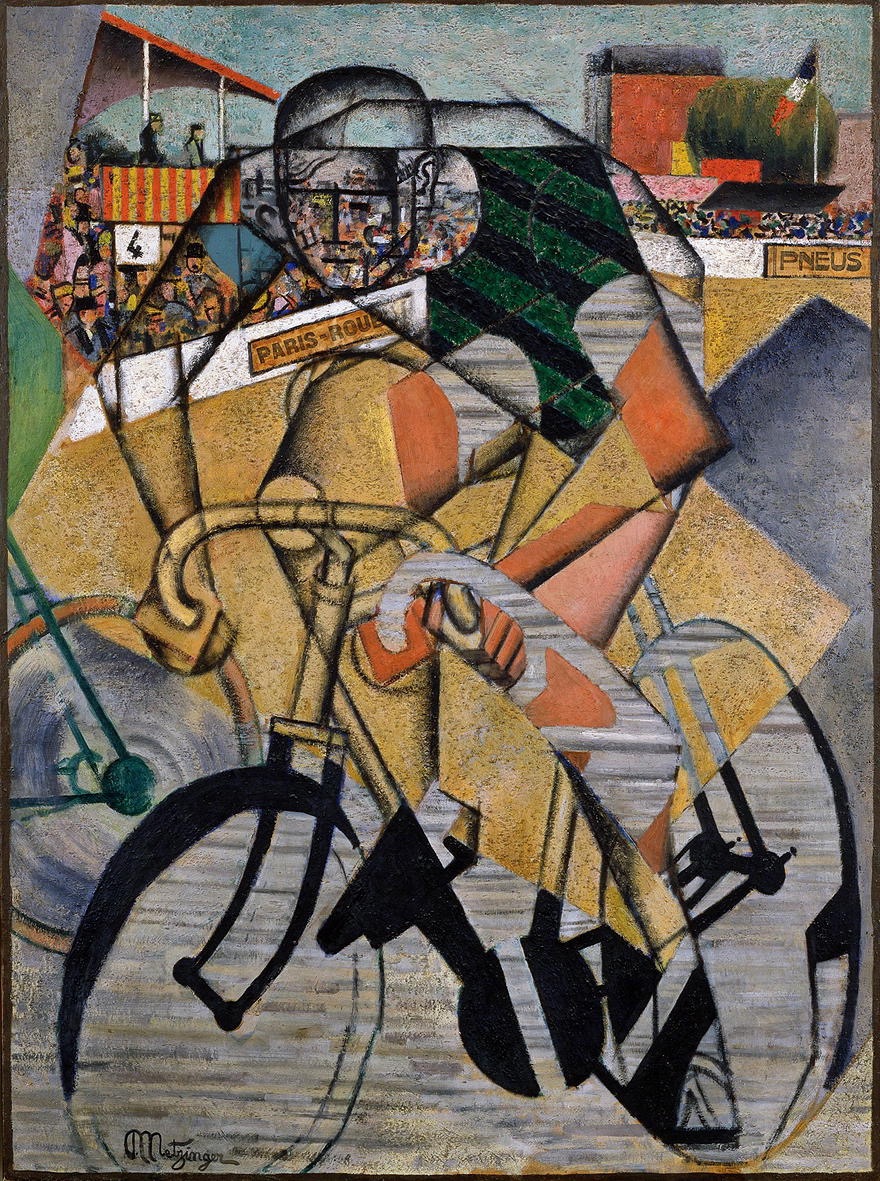
Jean Metzinger: At the Cycle-Race Track (Au Vélodrome) (1912)
"I'd just stopped paying such close attention to what I wasn't doing."
I'm Gettin' over the idea that I need to be Gettin' over ideas. I might instead get under, around, or through, or, alternatively, I might simply let a condition be. The idea that I might one day get back to normal might perhaps prove the most poisonous possible aspiration. I seem to too easily imagine that I once experienced conditions I had never actually experienced, my old, fondly remembered, largely fictional Old Normal. Memory's a notoriously unreliable mentor. I try to take things as they come and often fail, falling into one of apparently many cognitive traps. Just day before yesterday, I complained here of feeling StovedUp, as if that were a treatable condition rather than a statement of simple fact. I've felt StovedUp before and I most probably will feel StovedUp again. I might even find that I'm more frequently feeling StovedUp these days and pine after the time when StovedUp had not become my new normal. I only imagined it as a permanent condition, but, then again, nothing's permanent except perhaps that sense of permanence that sometimes visits.
I toughed out my StovedUp-edness.
SurpriseSpring
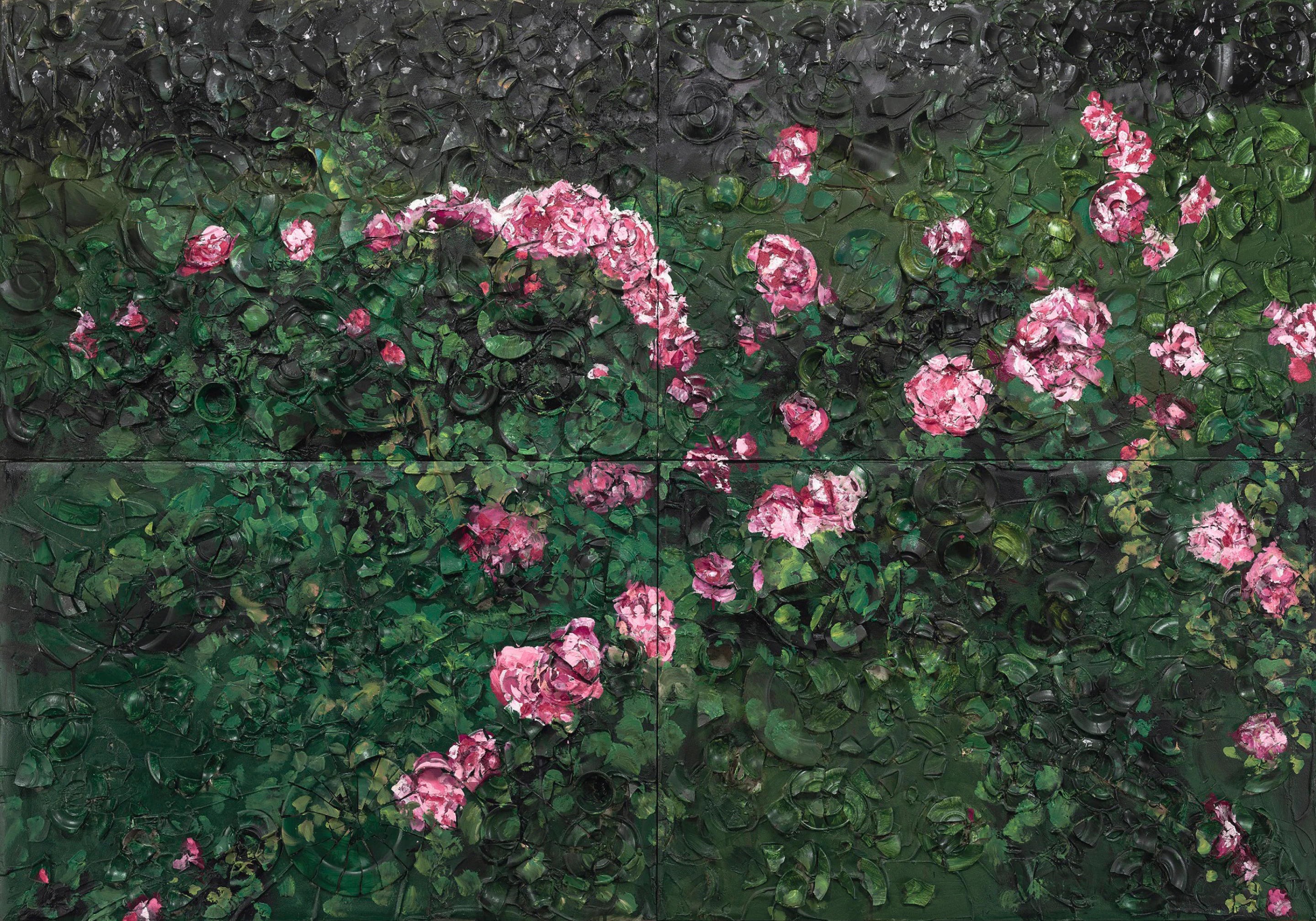
Julian Schnabel: Rose Painting (Near Van Gogh’s Grave) V (2015)
" … just not quite prepared for it this time."
Though I thought I was paying close attention, this Spring successfully snuck up on me. I'm struggling to get into synch with it. Most years, I would have already sorted through seed packets and sliced out at least one nursery visit by now, but I have barely soiled my overall's knees yet. I just cannot seem to find the rhythm of this season. After all those years in exile dreaming of how it would finally be when we were back in The Villa Vatta again, this turn of events seems particularly disappointing, perhaps tragic. It might be a bout of Dream Come True Syndrome, where the object of long affection becomes the opposite once secured, where the true love only lives in anticipation of finding it, and withers as soon as it's actually touched. Or, it might well be something considerably less insidious. How could I possibly tell which?
I've started baby steps.
StovedUp

Egon Schiele: The Family (1918)
"A reckoning might be impending …"
The Muse and I arrived out of exile one year ago today. We found an empty house waiting patiently for our arrival. We set up the inflatable bed in the living room then set about settling in. The Muse's son's family had not quite finished moving out, so I spent the next day helping to relocate their stuff out of the basement in preparation for the moving van arriving the following day. The rest, as they say, is history. Few days would be spent idle until the following winter. We shaped up the yard and repainted the front porch before setting about to refurbish nine rooms, floors, walls, ceilings, windows, and doors. I spent the last day possible to paint outside, finishing painting the exterior trim on the last window before settling into a long-ish idle winter. I'd supposed that I'd earned a break, but three months off have only left me feeling StovedUp for spring.
I have aches and pains the likes of which I never once had when we were on exile.
Stages

Jean Metzinger: Paysage coloré aux oiseaux aquatiques (1907)
" … it's all a series of silly games we play with passionate sincerity."
I began this Reconning Series because I sensed that I had entered a new stage of life. Typical of my species, I suspected that I'd detected this change considerably after the change had already occurred, but I still felt almost compelled to take a little deeper look and consider ramifications. One of the saddest cheap human tricks involves essentially engaging at the wrong logical level, for instance, engaging in age-inappropriate ways which might include wardrobe dysfunctions up to behavioral ones. Few sadder sights assail anyone than a person wearing some follow-on generation's fashions, the sixties grandma wearing Carnaby Street or the once distinguished gentleman in day-glo bell bottoms. These errors transcend mere faux pas to enter the realm of pathology, perhaps even treatable conditions. I suspect that many of these transgressions occur inadvertently and demonstrate more ignorance or personal insensitivity than volition. Few volunteer to appear the fool.
Yet many still manage to appear foolish, if not in their own eyes than pretty much everyone else's.
TheRoadToWashtucna

Rolling Hills of Palouse: Wojtek Powiertowski (2016)
"One goes nowhere to unburden."
I long ago noticed that every road in this part of the country seems to go to a little place that’s almost no place at all, Washtucna. Drive along I-90 between Spokane and Seattle and it seems that every exit between Sprague and Ritzville mentions Washtucna. Same story driving US395 between Pasco and Ritzville and US12 between Walla Walla and Lewiston, and WA127 between Colfax and the Pommeroy cutoff, every intersection points the way to Washtucna. It’s the center of the universe surrounding the center of the universe within which I live. It’s actually a very small and shrinking town plunked down in the center of a geographic square maybe seventy miles on a side. Bordered on the West by the mighty Columbia River, the East by the humble Blue Mountains, the North by I-90, and the Oregon border to the South, with the Snake River running its last stretch right through the middle before joining the Columbia. Within that square lies inarguably some of the finest cropland in the world and also some of the worst. Geologists refer to the stuff Washtucna sits on as scabland, basalt scrubbed almost barren by a series of Ice Age floods, leaving a dry Coulee country not quite large enough to qualify as grand, yet still plenty impressive.
Why would anyone willingly choose to take any of the many roads leading to Wadhtucna?
MidnightCreep
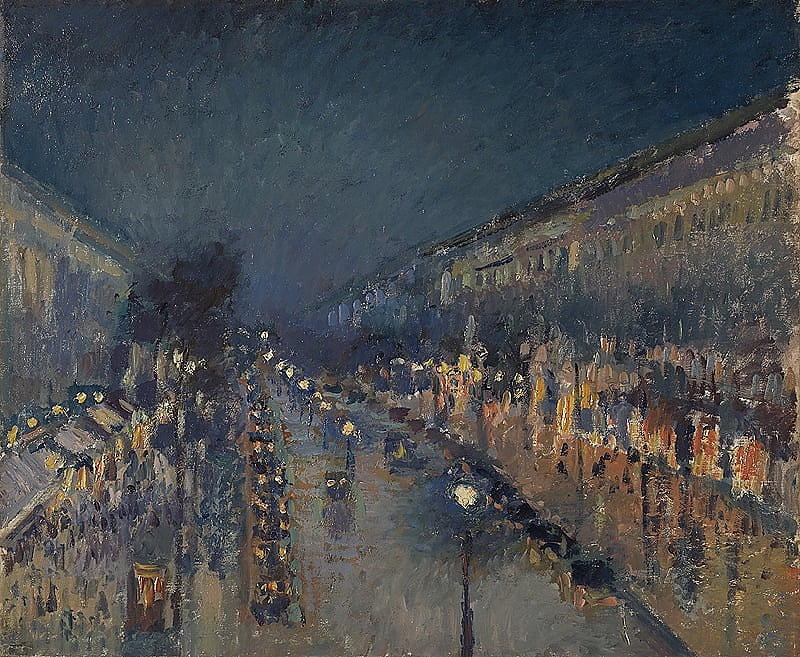
Camille Pissarro: Boulevard Montmartre in Paris (1897)
“I wrote it so that I would know what I was thinking.”
My work’s signature element must be that I engage in it almost exclusively in the wee hours. I’m a MidnightCreeper. I might forgive anyone for believing that I’m a little shy about my profession, for I engage in it so damned stealthily. Aside from the fact that I’ve lately, since reinhabiting our Villa Vatta Schmaltz, taken to writing in perhaps the most exposing window in the place, I remain terribly private and secretive about my practice. Few pass by to spot me writing in my wee hours and even then, I most often write in near total darkness, my desk only illuminated by the faint glow my laptop screen makes, my eyes dilated like a lemur’s, my silhouette essentially invisible from out there.
I remain rather embarrassed by my peculiar practice, which I think of more as ablution than actual profession.
Distantcing
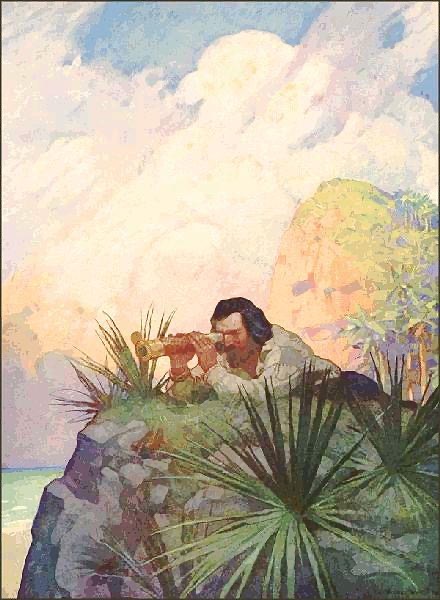
N.C. Wyeth: from Robinson Crusoe, Cosmopolitan Book Corporation edition (1920)
" … I feel as though I am still free floating …"
Between my career and our grand exile, I grew accustomed to being away from home. I always felt as though I adapted well to road life, but I see that I will most likely be more tied to one place, our Villa Vatta Schmaltz, in the future. Not even Our Damned Pandemic sequestered me at home at first, for it arrived at the start of our last year of exile, stranding me in our final interim home rather than what The Muse and knew to be our real one. Finally arriving home, I hardly knew how to comport myself. I'd been short-timing myself for so many years by then that I'd become more attached to my shadow than to my actual presence. You see, as a passing entity, one gets excluded from many of the rights and obligations of full citizenship. One votes, of course, in local elections, even if on exile, but one probably does not feel as though they're contributing to any personal future by so doing, since the one certain thing always remains that you will not still be there by then. On exile, one never possesses a local future, only a far away one, and only then if lucky. One forfeits a full present local identity for the duration of exile duty.
Washing up back home felt both enormously relieving yet also deeply disturbing, for I'd grown accustomed to the emotional as well as the physical Distantcing.
NextSteps

Johannes Vermeer: Girl Reading a Letter at an Open Window (c. 1657–1659)
"This is how our world progresses."
Beginning might break surface tension but it does little to nothing to determine NextSteps. These seem barely implied by initial movement, uncertain even of the direction taken so far, for little distance was covered and no clear rhythms or end points have yet come into focus. The first few postings of any new series sort of try on identities, hoping something clicks, for the Author aspires to create something capable of making some sort of difference. The significance of his topic choice not yet obvious, similar past beginnings managed to step up to and into their own importance, but there's nothing insisting that this one must or will step up to or into until it does and already has. I mark my time to hold my place in line. NextSteps emerge awkwardly every time.
Breaking surface tension, though, amounts to the first great success of this series for me, for nothing's written, either, insisting that surface tension might be broken this or any time.
Begineering
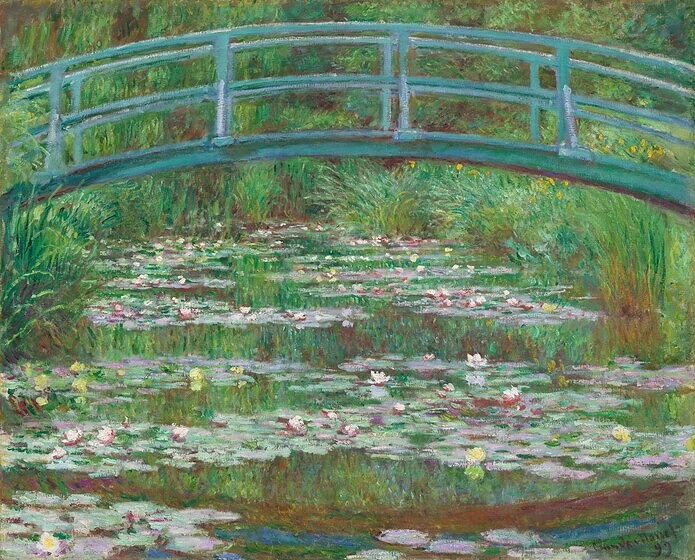
Claude Monet: The Japanese Footbridge (1899)
"I am a begineer!"
The first full day of Spring and I find myself Begineering. Beginning a fresh series, sure, but also Reconning, investigating this new space I attempt to create. I chose Reconning as the name of this series because it lately occurs to me that I have been either outrunning my past manners of living or am very likely to be out running many of them soon. Like many in my generation, I was able to extend my adolescence far beyond my childhood, and my mere adulthood well into middle age, and my middle age out to beyond its relevant range, leaving me in uncharted and largely unwanted territory. I never aspired to achieve either majority or dotage, but they seem to have almost successfully conspired to overtake me. I could die my hair and seek Botox® injections, or find some semblance of dignity in my eventual downfall. We all know for certain where this path is heading, but not its timetable.
No need to go all morbid about this.
Whimper
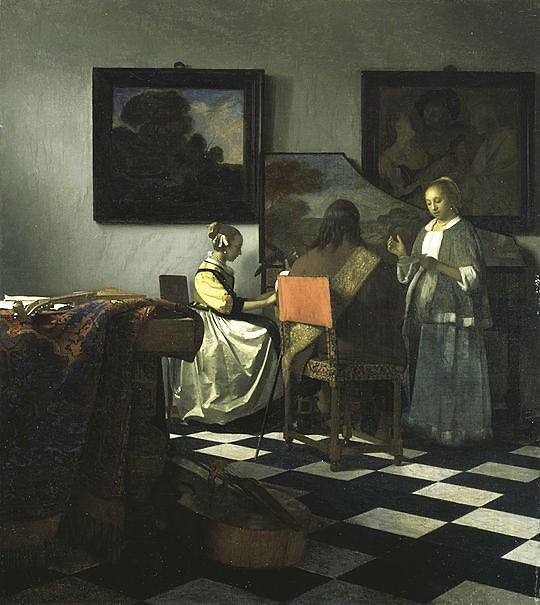
Johannes Vermeer: The Concert (circa 1664)
"Thanks for coming to my table."
The final essay in my Authoring Series should wrap up my investigation, and I suppose that this piece might manage to do precisely that, though it won't succeed in the way I'd imagined it might when I started this series three months ago. Then, I had the writer's equivalent of visions of sugar plums dancing around in my head, for I, as seems so often the case, began this enquiry under innocently false premises. I'd imagined that Authoring might result in some sort of a publishing contract and a physical book sitting coquettishly on some bookstore shelf somewhere. How nineteen forties, right? We're in the twenty-first century now and you might not remember the last time you set foot inside a bookstore, and online book shopping's different enough to not really qualify as book shopping at all. Further, the book market has been static since 2007 when 400,000 new titles were shoved into it. Today, four million new titles compete for the same shelf space, much of it virtual. My publisher, the one who published my best selling The Blind Men and The Elephant back in 2003, reports that the only books that stand much of a chance in today's cluttered market are ones tied to an existing marketing plan, a subscribed workshop offering or a frequent keynote speaker. That's not my manuscript. It's not my aspiration, either.
It might be that Authoring's no longer as I imagined it might be back when I started this enquiry.
Patience

Vincent Willem van Gogh: Rain (Saint-Rémy, November 1889)
"Whatever it becomes, comes later."
I don't fear that we'll not get clear through all of Authoring's Stations of the Cross before we run out of time to explore them here, I know for certain that we'll run out of time. Running out of time seems Authoring's common companion, for Authoring as a craft and as a profession turns out to be one of the longer cycled occupations. This seems fitting if only because once published, a manuscript becomes essentially immortal. Even if it joins the ranks of the majority of published works and gets quickly returned for pulping, those three copies submitted to The Library of Congress will account for something, and anything shelved in that permanent collection remains forever retrievable. That said, Authoring's Fifth Station of the Cross simply must be Patience, for Authoring will not be rushed. Even the fast track to publication seems terribly pedantic, with checks and unbalances complicating each and every step. Even then, an error or two might occasionally get chiseled into granite, but the intention of publishing flawless works mostly works. Authoring features innumerable moving parts.
My folly at setting aside a quarter year to consider Authoring says much about the profession.
Promotion

Sassetta AKA Stefano di Giovanni: The Agony in the Garden (1437-1444)
"This Fourth Station ain't worth my tarrying over."
And so we come to the Fourth Station of the Authoring Cross, Promotion. I have nothing authoritative to say about Promotion, for I have never mastered it. The real underlying reason I began this enquiry into Authoring had everything to do with Promotion, and, specifically, SelfPromotion, which I've long recognized as my Achilles Heel, as I explained in my earlier Reconsidering series. For someone with a degree in Marketing, I seem a particularly inept marketer. I shudder whenever I'm called to say a few supportive words about my work and either feel as though I'm bragging or underplaying, often both. I had hoped that a more focused considering of Authoring might enable me to find a more comfortable frame within which to place this Fourth Station and its many expectations, but as I watch the calendar moving toward the expected ending of this endeavor, I realize that I'm no closer to feeling any more comfortable with promoting my work than I ever was. I feel as though I've played this game to stymie again after specifically re-engaging again to learn how to play around or beyond stymie. I feel about ready to accept that I actually am me, and that the earlier instances of myself which I thought were perhaps just underdeveloped manifestations might have been instead finished pieces and I've been in denial for decades. This result does not surprise me.
I've been shopping the usual marketplaces.
FutureFocus

Georges de La Tour: The Fortune-Teller (probably 1630s)
"The universe couldn't care less what you decide."
Much of whatever Authoring entails occurs on the broad plain between writing and publishing. There, the Fundamentally Unanswerable Questions reside, serving as apparent barriers between the writer and his aspiration to become a published Author. These questions also serve as the raw material for utterly transforming the Authoring experience both for the better as well as for the worse. As barriers, they reliably produce what certainly feels like worse experiences, at least until they encourage some breakthrough thinking that transcends the initial trouble. What started as a continuation of the story about writing evolves into a deeper and richer story situated above and slightly to one side of the writing as well as to whatever story the manuscript attempts to tell. This perspective emerges from what seems like overly extended wandering in wilderness, from an abject loneliness and deep isolation, from genuinely not knowing, the sure source of all understanding.
Authoring's Third Station of the Cross might well represent the lion's share of the whole Authoring experience.
Voce

Orazio Gentileschi: David Contemplating the Head of Goliath (c. 1610)
" … it's absolute magic!"
I'll call the Second Station of the Authoring Cross Você [pronounced Voe Che], because it mostly deals with the Author's manner of speaking. The writer writes while the Author shapes. The writer creates rough approximations in relative isolation, each piece produced in absence of any broader context. Once the writer completes the pieces, the Author can set to aligning those chunks into a more continuous whole. Você becomes primary among the various elements of this aligning process because it's the subtlest piece and also the one most easily noticed as absent. The voice the reader finds speaking out of the page must be recognizable, not different from chapter to chapter, beginning from end. Further, the Você stands above and beside the story and serves as the medium within which whatever story gets told. It's often best when as innocuous as the almost still and silent voice each of us knows as our own internal one, our conscience, if you will. Whatever the Author chooses as the work's Você, aligning and preserving that timbre might be the underlying purpose of the so-called Proofing pass, which superficially seems to mostly focus upon spelling and ridding the draft of dangling participles.
A great editor can preserve and even amplify the Author's voice better than even the Author could.
TinyShifts
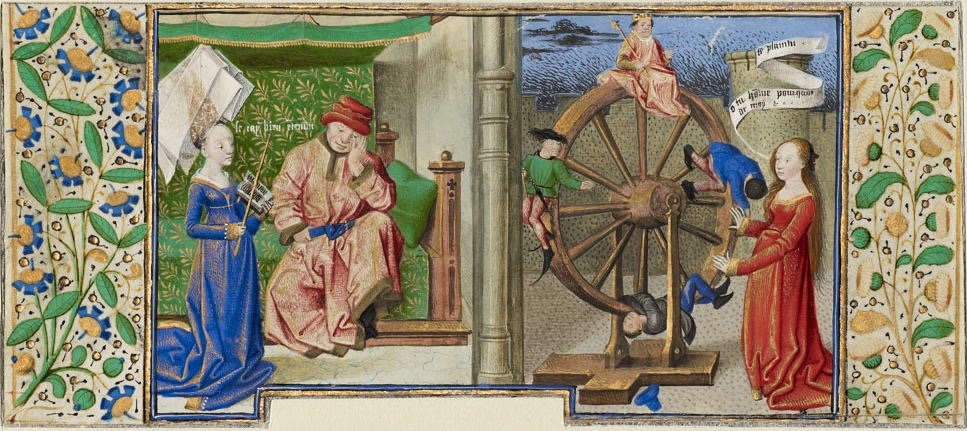
Coëtivy Master (Henri de Vulcop?): Philosophy Consoling Boethius and Fortune Turning the Wheel (about 1460–1470)
"The greatest significance tends to hide in the tiniest focus."
I yesterday mentioned The Authoring Stations of the Cross, my sense of Authoring's underlying sequence. My sense has shifted since I started this Authoring enquiry, but shifted in unanticipated ways. Like you (I suspect), I focus upon what might make a big difference, figuring I can always fine tune the tiny side stuff, so I set about looking for whatever might make a huge contribution in my understanding of Authoring. As I near the end of the enquiry, I realize that TinyShifts seemed to have made the most significant differences, perhaps a contradiction, though not, upon reflection, a particularly surprising one. If change sometimes seems frustrating to create, it's often due to focus. I'm so intent upon seeing significance that TinyShifts slip right through my diligence. My futures tend to slip in when I'm paying attention to stuff that couldn't possibly make much difference. Authoring's no monolithic practice, but a series of almost insignificances only the experienced appreciate. Authoring's very likely to slip right past even the attentive at first because us attentive ones tend to focus upon the wrong scale, by which I mean, way too large.
I see now that if I shift just a couple of things in my daily practice, I will have much better integrated Authoring into my routine.
InfiniteObjectives

Artemisia Gentileschi: Danae (c. 1612)
"It's infinite engagement or its meaningless …"
With a scant week left in my scheduled Authoring investigation, I stumble upon an understanding that might have better served me at the beginning. It's really no great tragedy if I prove myself to be too late smart again, but then I wonder how this inquiry might have proven different had I achieved this small enlightenment nearer the beginning of this effort. Looking back, I realize that I might have frittered away quite a lot of time failing to winnow whatever I was up to into a finite form, as project management theory and practice have always counseled. The job of the proper project manager was always said to involve building baffles and defining edges such that the 'process' as well as the product might be thoroughly described in definite language, without hyperbole or abstraction, for the tools and techniques of 'proper' project management each utterly depend upon thorough grounding. No Utopian notions allowed. No notions allowed at all, only tangibles.
I long ago wrote a piece about solving the world hunger problem, which I characterized as an aspiration, not a realizable objective.
ComFormation

Artemisia Gentileschi: Judith and Maidservant with Head of Holofernes (1608)
" … just so much spit in an indifferent wind."
Half of the people I'd Bcc-ed on the manuscript submission email found that message in their spam filter, so it seemed a reasonable assumption, a fifty/fifty proposition, that the publisher's spam filter had also snagged my missive. I explained yesterday how hesitant I felt about calling to confirm receipt, wanting to avoid appearing pushy, but after further goading from my supportive community, I took the chance and quickly confirmed that the publisher had, indeed, received the thing and was warmly anticipating reviewing what I'd submitted. In that moment, a line of communication manifested, its first message comforted more than I can describe. The manuscript had survived another passage from source to out there and it had found another interested reader. The publisher, too busy to review the damned thing yet, warmly anticipated reviewing it. He promised to get back to me just as soon as he's finished his perusal. That should be soon. The Blind Men was submitted and accepted in the same week. This one, accepted or rejected, should prove little different.
The often lengthy periods between submission and ComFormation hold no substance.
StageFright

Orazio Gentileschi: The Lute Player (1612)
"I'm just barely learning … ."
Once the manuscript's submitted, a form of StageFright settles upon the budding Author. He wants feedback but dreads it. He wants acceptance without suggestions, especially those damned helpful ones. Part of him hopes his submission just gets lost in the mail. Should the package return, he might file it on an easily overlooked shelf and conveniently forget to open it rather than submit to the judgement of the world out there. It might be a special curse that those who engage in the performing arts—and make no mistake, Authoring qualifies as a performing art—all suffer from some degree of StageFright. We desperately want to share our gift, however modest, with a world that deep down terrifies us with its casually harsh criticisms. Formally trained artists get themselves subjected to toughening up exercises as a part of their studies. They're taught to dish out harshness and also to take it in huge volumes so that they might relegate others' judgements into mere background noise. They learn not to take that shit very personally, to interpret criticism as first about the critic, and to thereby hold their creative space. Even the trained ones, though, experience a kind of StageFright as a form of respect for the performing space, which should rightfully always awe an artist at least a little bit, lest they grow calloused about entering it.
In my youth, my first real career was as a 'single acoustical artist,' as a so-called singer songwriter.
ReConsidering

Unknown: The Stigmatization of Saint Francis,
and Angel Crowning Saints Cecilia and Valerian, French or Italian (1330s)
"I've done dark wood before."
Three years ago, I spent the whole first quarter of the year Reconsidering. I was then a year and a half into what has now turned out to have been a nearly four and three quarters-year effort, one within which I've dedicated a part of myself to writing and posting a daily essay. I began the exercise to remind myself that I was, or had been at one time, a writer. I suppose that I quickly reassured myself before falling into a rather tender trap, one which insisted that if I really was a writer, I should be writing daily, or, perhaps I'd really need to continue daily writing or lose my identity as a writer. Whichever, I've continued the practice, which you've doubtless noticed. Every morning another reflection arrives. I finished my Reconsidering series on March 20, 2019, while visiting our then rented out home in Walla Walla, the final reflection, reassuring. [Link here.] Now, that series exists as a book, or, more properly, as a manuscript, as of yet unsubmitted for publication. I've carried the presumption that one day, Reconsidering would certainly reach publication, but my more recent focus upon Authoring finds me reconsidering that earlier presumption for that one and its soon to be nineteen brothers, as well as those two others I've written and should some day get around to properly compiling into submittable form. I do not lack for product.
One of the more useful outcomes of any investigation might be the inevitably different perspective focused perception produces.
Spent
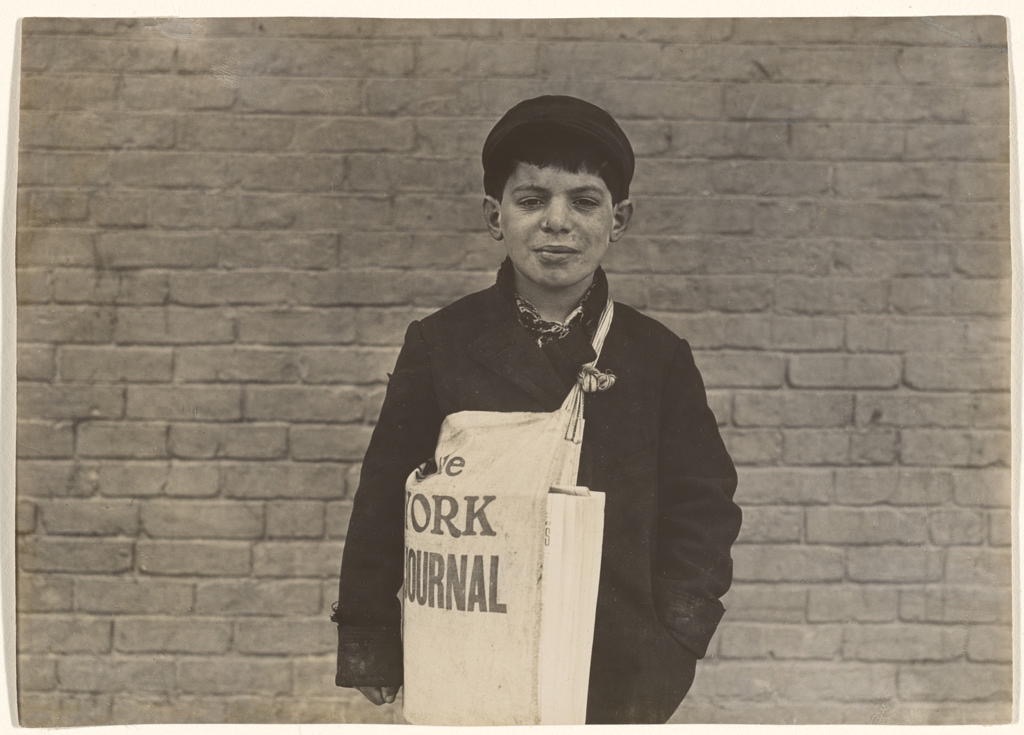
Lewis W. Hine, photographer: Tony Casale, Newsboy, Hartford, Connecticut (March 1909)
"It might be that his urge toward Authoring was a big mistake."
This announcement will not make headline news. It won't make the back pages, either. After seventy-seven days Pursuing Authoring, our budding Author's feeling Spent, like a spawned out salmon gasping in the shallows of his home stream, wondering what that excursion might have meant. It certainly seemed circular, a round trip, there then back again, but what was gained and what might have been lost? What was that purpose again? What initiated the urge, the one that pushed the fish out of sufficiency into an apparently necessary pursuit. The long and tedious descent to sea level, the lengthy period feeding in the open ocean, the perilous return up fish ladders and over dams, dodging sea lions and gill nets, what was all that drama about? Our fish feels reasonably certain as he watches his once-noble nose turn crooked and rotting that this might not have really been about him, that he was only playing a part in a much wider and longer arc of history, a bit player, an instance. Whatever the purpose or the reason, our fish feels certain he's Spent, done for now, over, finished.
This is the point where the Author steps in to make light of the gravity of that opening paragraph. What? He isn't?
Serializing
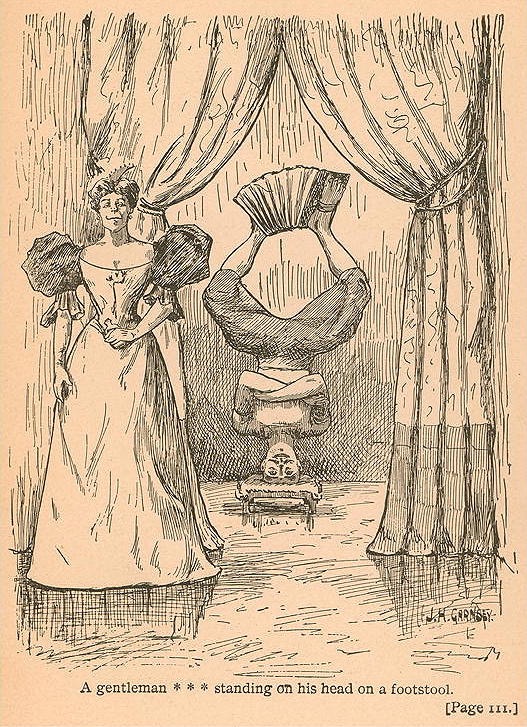
J. H. Garnsey: A gentleman . . . standing on his head on a footstool,
from Billtry, by Mary Kyle Dallas (New York: The Merriam Company, 1895).
An illustration from a dime novel.
"Whatever produces Ink, works."
A hundred and fifty years ago, many popular novels were published twice. They were first Serialized in a newspaper or weekly magazine, then later compiled into a book, sometimes in different editions ranging from cheap dime novels to leather bound presentation finishes. By the time a Dickens novel was published, it had already been read by tens of thousands, each novel already a best seller at the point of publication. The blog, I guess, replaces such Serialization in today's publishing world. For an Author, Serializing offers one great benefit over simply publishing books, a more frequent experience of "Ink," the term Authors use to describe what it feels like to see their work in print. We say that we've received ink as if we'd received a blessing or a sacrament or something similar. It might serve as the true purpose of Authoring, to receive a jolt of recognition when spotting one's own writing upon a page.
It doesn't matter to us Authors, either, whether that Ink comes in the form of a Letter To The Editor in a newspaper or a hard bound book
KnotKnowing
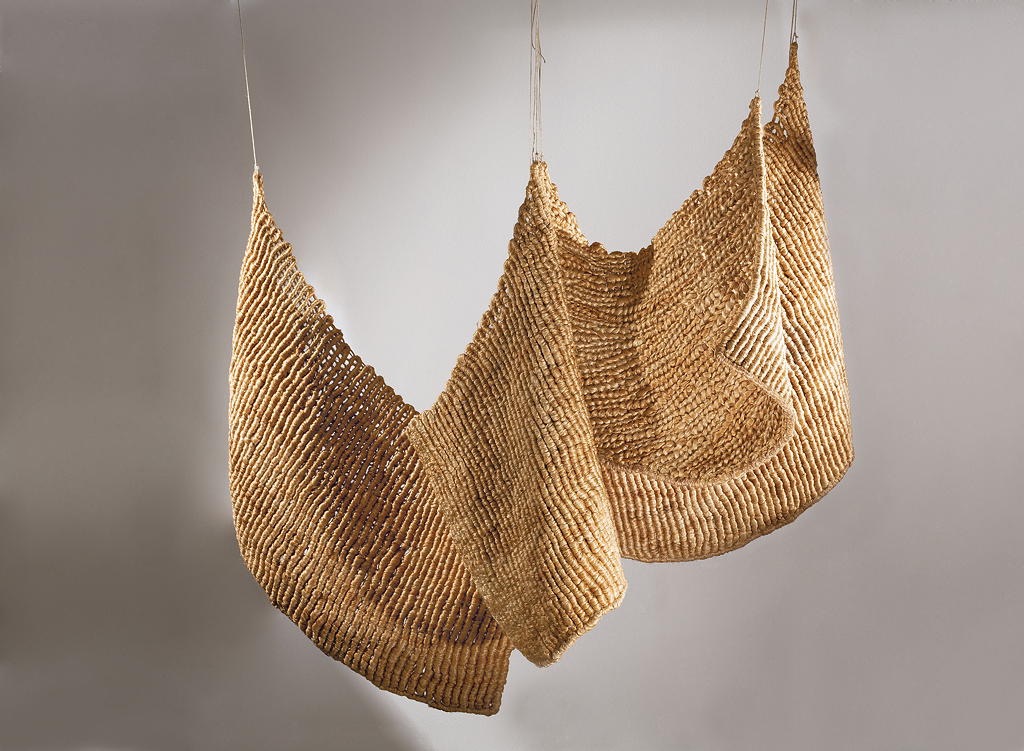
Aurèlia Muñoz: La font de la vida [The Source of Life] (1976)
"David The Rather Mediocre Author But Still Perfectly Normal"
Authoring has thus far offered me an extended experience of not knowing, KnotKnowing, by which I mean coming to discover that I'm tangled up in another Gordian Knot again and again and again. These knots seem to be the kind that cannot be simply untied, though a few have proven vulnerable to a blade. I have, like Alexander The Great (back when he was still widely considered Alexander The Rather Mediocre) just cut the untenable knots in half, thereby untying them after a fashion, but I have proven almost always incapable of conventionally untying them. My inability to succeed at conventional untying first came as a blow to my delicate ego. I felt that if I was really going to ever become worth anything as an Author, I should most certainly be capable of untying most any conventional knot, but I clearly was not. This acknowledgement reverberated down through my spirit to weaken my resolve as well as my self esteem. I felt as though I must have been proving to be a truly terrible Author.
Part of my difficulty arose from my insistence upon attempting to answer the wrong questions.
AllIn
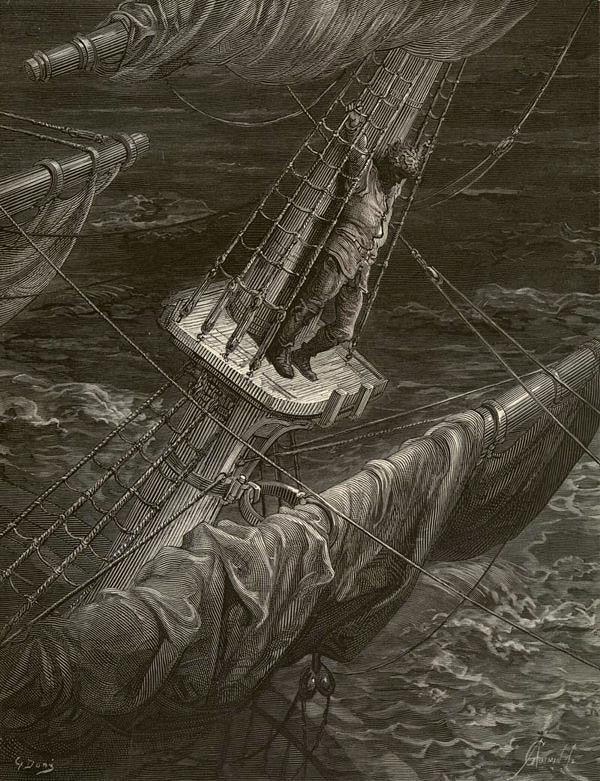
Gustave Doré: Rime of the Ancient Mariner (1877)
"AllIn and then some … "
When I started this Authoring Series, I went AllIn. Like you, I was reared on the gospel of commitment. If I was going to do something, I should fully engage rather than dabble. I should take my engagements seriously. Consequently, my work has generally become my identity more than my occupation. I understand that when we declare what we do for a living, we say "what we are," this while also insisting that we maintain work/life balance, whatever that might be. For me, my work has usually been my identity, or perhaps I should say that I have largely mistaken my work for my identity. I do seem to become whatever I'm doing. When I throw on my overalls, I become Handyman Dave for the duration of the chore. When I play my guitar, I become David, my single acoustic performing artist self circa 1975, not having aged a minute. When I cook, I cook rather than dabble around the edges. The very minute I started this Authoring Series, I became an author for all intents and purposes. The Refurbisher I'd been the previous quarter disappeared as I focused my attention, heart, soul, body, and spirit on Authoring. Who am I really? Interesting question.
Of course, I was just play acting, for I had few clues then just what Authoring entailed.
CopingBetter
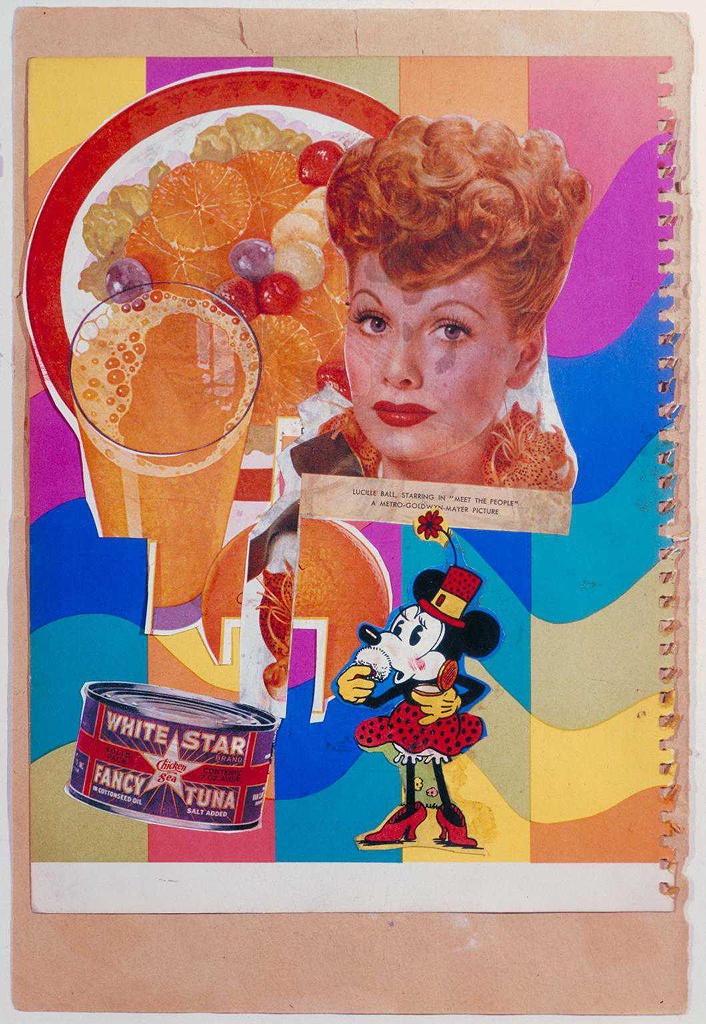
Sir Eduardo Paolozzi: Meet the People (1948)
"What's that latest book about, David?"
Once an insight visits, the real work begins, to interpret and explain it. The initial insight passes quickly. It might linger for less than a minute, perhaps less than a second, a flash of lightning, difficult to believe it was ever there once it leaves. The interpretation relies upon observational memory, the type of observation taken when blinking, uncertain anything was even seen, but fueled by a flush of conviction. Something terribly profound just happened. Let's not let it get away from us, now.
The first impression might serve as little more than an anchor for the receiver of the insight, an index, a reminder.
Cogitation
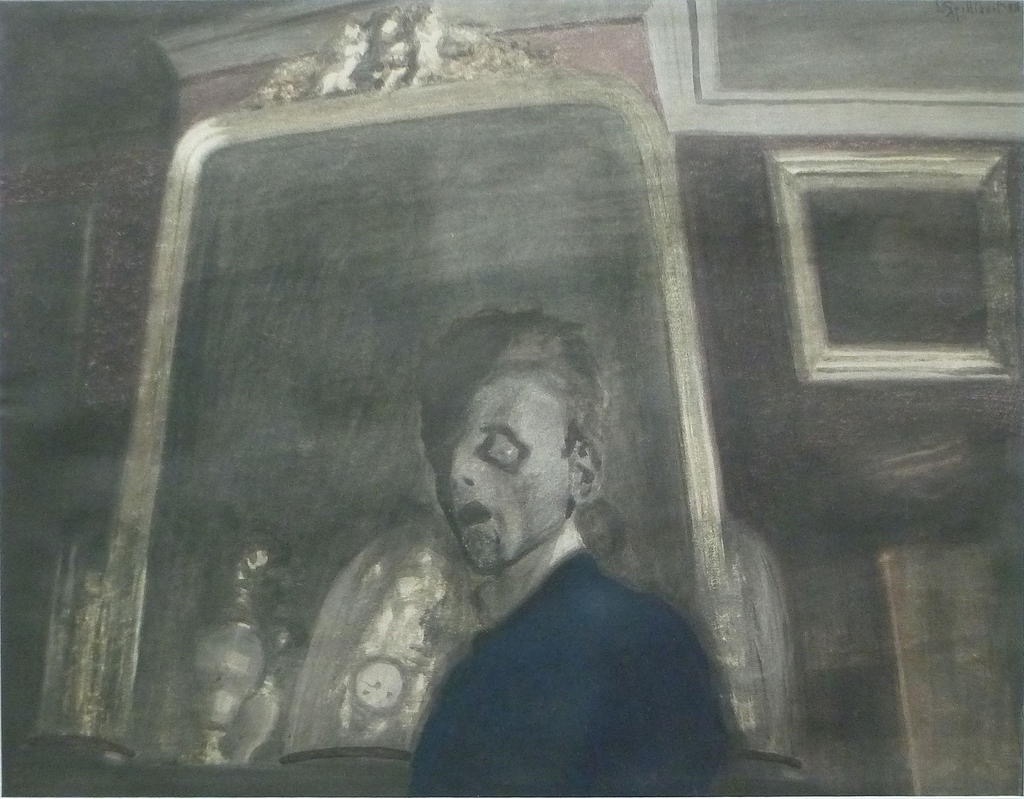
Léon Spilliaert: Self-Portrait Before the Mirror (1908)
"This Authoring's convoluted business …"
Looking back through my accumulated Authoring stories, I discover that I almost two months ago posted one entitled Cogitating which considered the long contemplative periods Authoring also entails. Today, I want to take the noun form of that same idea and explore where that might lead me, though I already know that, being a noun form, it won't contain much action or acting. As a budding codger as well as an Author, I perform much of my magic via Cogitation, by which I mean by apparently doing nothing. I excuse myself by explaining that I'm considering, thinking, figuring out, though I'm clearly not any sort of action figure while so engaged, if, indeed, I can even fairly describe myself as engaged during those times. I have gratefully not resorted to watching daytime television—how could I live with myself then?—but to any outside observer, (how did YOU get in here, anyway?) I might easily appear to be simply, perhaps profoundly slacking, and I might be slacking. The evidence that my Cogitation might bear fruit remains firmly in the grasp of the future tense during these lengthy periods. Cogitation accomplishes nothing, and without evident elegance, either.
I could probably pass for a retiree, if I would only allow myself to retire, but I remain tenaciously engaged even when, even if, I seem awfully disengaged.
WrongQuestion
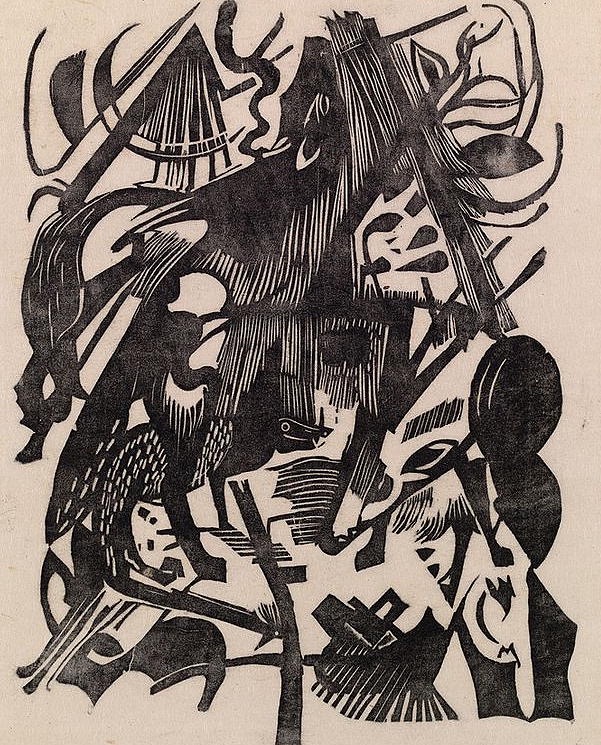
Franz Marc: Birth of the Wolves [Geburt der Wölf]) (1913)
" … this tactic sometimes even works … "
They always ask the WrongQuestion, probably because there are no completely right and proper ones. The purpose of asking WrongQuestions might vary a bit from what we might innocently consider the purpose of asking a proper question, presuming, of course, that such questions exist. The purpose of asking WrongQuestions might extend no further than a desire to start a conversation, like when someone asks Fundamentally Undecidable Questions, though those might prove both right and proper. The difficulty, or at least a chief difficulty, arises when one presumes that a WrongQuestion is, in fact, a right and proper one, and being right and proper, that it deserves a right and proper answer. Therein begins the trip down into a rabbit hole and into an often inescapable labyrinth.
There are tells, clues that the question offered might prove problematic.
TimeLagging

Gustave Doré: Found in the Street (1872)
" … trust in my experience, even when it seems, at best, half-vast."
The Muse knows that if she wants to understand my perspective, she'll have to ask and then … … wait, for I never seem capable of responding instantly with any status request. Ask me what I think and my first reaction will be to wonder, "Was I supposed to be thinking?" I'll need to sort out some fairly hefty existential baggage before I'll muster a response. Asking me how I feel about something should spark an even lengthier delay, for I do not keep my feelings within easy reach. My mean lag time between intention and engagement tends to be lengthy, too, as I seem to need to consider most things through to some point of leverage before physically starting, so it might well seem as if I had been actively forgetting to follow through rather than spooling up for my opening gambit. I have proven to be a most frustrating partner.
I am a frustrating partner for myself, too.
ThatVoice
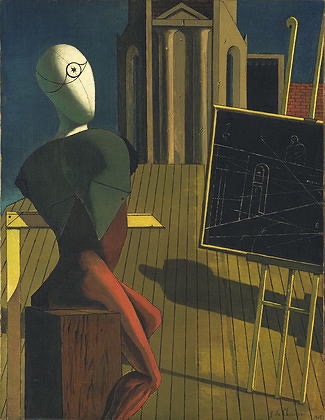
Giorgio de Chirico: The Seer, Winter 1914–15
" … wondering if my Authoring voice might ever gain parity or prominence."
I have a voice in my head. Or is it that a voice in my head has me? Either way, there's a voice up there, though I'm uncertain if that voice belongs to me, if it's mine. Like when I hear my voice on a recording, this voice doesn't very much sound like mine, like the one I hear when I speak out loud to myself or to anyone, so I suppose that the voice in my head could belong to anyone. It chatters. It narrates my life. It tells the stories as they unfold before me, as if it had access to the script. Sometimes it reads ahead. It can fill me with delight or dread. It's my faithful companion. When I startle awake at zero dark thirty in the morning, ThatVoice greets me. As I fall asleep in the evening, it wishes me well, often by replaying that day's greatest hits and misses. It's never far and rarely silent.
Radios were originally installed in cars to prevent ThatVoice from having too much influence over each driver, to promote more uniformity and less daydreaming.


